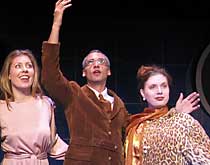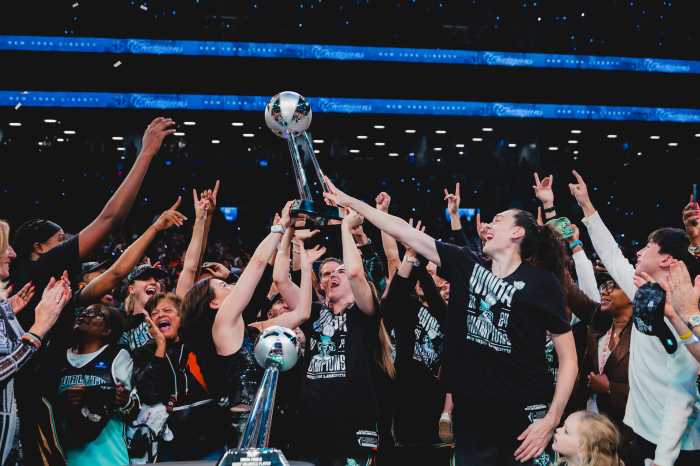For some reason, The Gallery Players have
chosen "Merrily We Roll Along," one of Stephen Sondheim’s
biggest flops, as their final production of the season. The musical,
with a book by George Furth and lyrics and music by Sondheim,
opened at the Alvin Theatre on Nov. 16, 1981, and closed 12 days
later.
It doesn’t get much worse for a Broadway show.
Despite the valiant attempts of Gallery Players director J.V.
Mercanti and an exceptionally talented cast, a flop is a flop
and need not be resurrected.
"Merrily We Roll Along," the sixth collaboration between
Sondheim and director-producer Harold Prince, was based on George
S. Kaufman and Moss Hart’s 1934 similarly-titled play about a
playwright who has risen to fame by giving up his ideals, and
his two old friends – a painter who, unlike the playwright, does
not compromise his principles; and an alcoholic writer, supposedly
patterned after Dorothy Parker (who did not appreciate the portrayal).
There’s also a composer of musical comedies who is reminiscent
of George Gershwin.
If the story of someone achieving fame and fortune only to lose
his soul is not particularly original, Kaufman and Hart attempted
to bring a new twist to this tired plot by telling it in reverse.
Audiences don’t seem to have been much impressed with this distinction.
By the time of "Merrily We Roll Along," Prince had
collaborated with Sondheim on five musicals: "Company,"
"Follies," "A Little Night Music," "Pacific
Overtures" and "Sweeney Todd." Prince, who was
53, wanted to do a show that would appeal to a younger audience,
and the old Hart/Kaufman play seemed to fit the bill. Unfortunately,
it didn’t have much else to offer.
Although Sondheim later said, "We were all responsible,"
for the failure, the musical effectively ended his long collaboration
with Prince.
"Merrily We Roll Along" doesn’t work because the characters
don’t become sympathetic until the second half of the play. We
see them as avaricious, deceitful and phony. But we don’t understand
how they got that way. When, after intermission, we learn of
composer Frank Shepard’s (Michael Hunsaker) early idealism and
the way he struggled for success with his singer-wife, Beth (Erin
Williams), and his lyricist partner, Charley Kringas (Nicholas
Sattinger), fitting the pieces of the puzzle together does offer
some of the satisfaction of figuring out a mystery – but this
is all too little and too late.
A fabulous score might have saved the play. But except for "Bobby
and Jackie and Jack," a biting and hilarious send-up of
the Kennedy years, and the last number, "Our Time,"
the songs are uninspiring and uninspired.
So what does this production offer? For one thing, there’s the
energy of a crew bailing furiously on a sinking ship. For another,
there’s a great deal of real talent on this stage.
Williams has a rich, lyrical soprano voice. Sattinger has a comic
genius that deserves a better platform to establish itself. Anne
Gaynor, who plays Mary Flynn, the girl Shepard should have married,
is both funny and poignant.
Mercanti does a good job keeping the play rolling along. For
the most part, the director is successful. But Mercanti makes
a few whopping mistakes. He has placed the piano on stage so
far away from the piano playing backstage that it’s disorienting
to even the most forgiving in the audience, and he’s cast Michael
Ruby and Jerielle Morwitz as Beth’s mother and father – even
though they look more like her younger brother and sister!
The "just right" wardrobe of costume designer Melissa
Estro and Claire Hayes is perfect down to the thin ties of the
early ’60s. But this reviewer cannot fathom why they couldn’t
dress the excellent Steve Velardi in a suit that fits him. True,
he’s not a tall man, but neither was Mickey Rooney.
Finally, there’s Tim Amrhein’s simple and effective set, which
consists of blue tile walls, and screens and platforms that are
repositioned to create a theater, a greenhouse, courthouse steps
and various rooms in various apartments and offices.
According to an old saying, the three factors that make for success
in a retail business are "location, location and location."
The lesson of "Merrily We Roll Along" might well be
that when it comes to theater, the three most important factors
– no matter how talented the cast and crew – are material, material
and material.
The Gallery Players production of "Merrily We Roll Along"
plays through May 23, Thursday through Saturday at 8 pm, and
Sunday at 3 pm. Tickets are $15, $12 seniors and children under
12. The Gallery Players are located at 199 14th St. between Fourth
and Fifth avenues in Park Slope. For reservations, call (718)
595-0547.
























